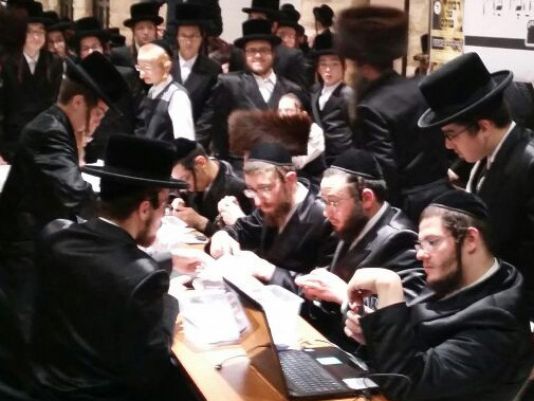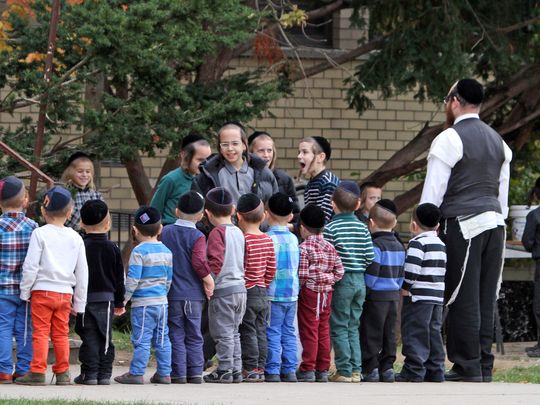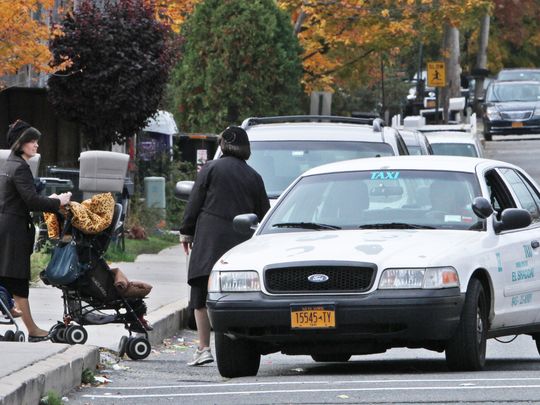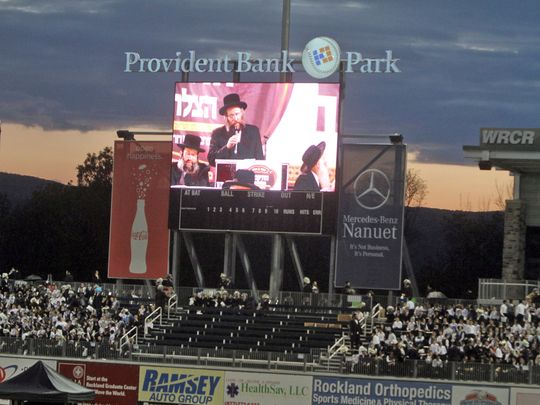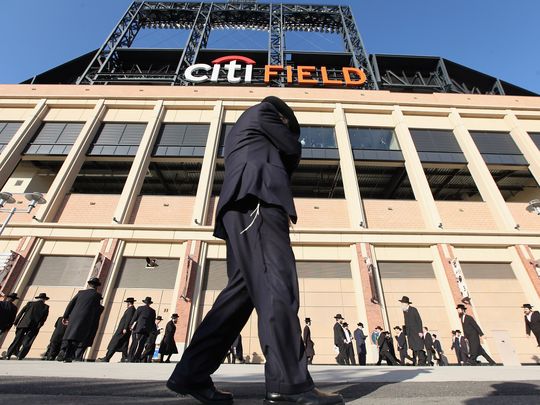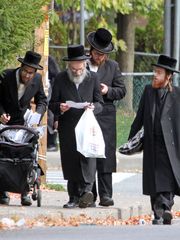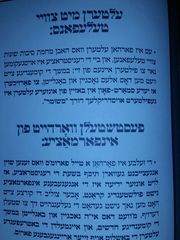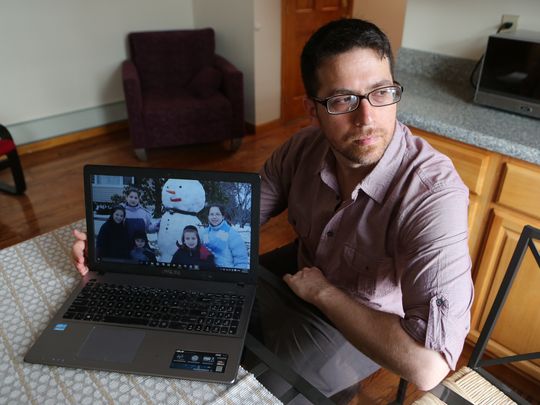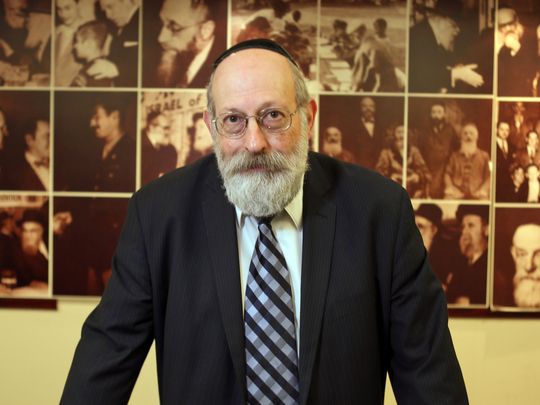Tech Ban for New Square School Kids, Parents
By Adrienne Sanders
This article is staff writer Adrienne Sanders' latest in an ongoing series that looks at the East Ramapo school district with its unique blend of private and public schools. NEW SQUARE - Each year, when registering their children for private school, parents in the all-Hasidic village of New Square must agree in writing to follow a detailed list of very specific rules or risk the expulsion of their children from the only school in town. For example, mothers are banned from driving, and they must shave their heads and wear only clothing that extends at least 5 or 6 inches below the knee. The far more abbreviated list of rules for fathers requires them to pray regularly with a quorum and refrain from cutting their beards. This fall, however, New Square authorities introduced several new rules that reflect the community's fears about the dangers of the Internet. The changes have renewed critics' condemnation of the Skverer sect's attempts to control its followers particularly women. The new rules include: Mothers are prohibited from using smartphones even for business purposes. Mothers and fathers must cease using WhatsApp, a popular smartphone messaging application. As announced last month on a large flier taped to the village's synagogue wall no one may use cellphones without web filters. Authorities posted the notice after it was discovered that some adults were keeping second, unfiltered phones in addition to their approved "kosher" ones. The rules are the ultra-Orthodox sect's latest attempt to keep the Internet out of the hands and minds of its followers for fear that exposure to the secular world will lead to moral decay and community disintegration. Radios, televisions, Internet connections and newspapers are also banned in the small Rockland County village. Guided by the community's spiritual leader, Rebbe David Twersky, followers, known as Skverers, strive toward the Hasidic ideal of living a hallowed life, in which even the most mundane action is sanctified. "We are human beings. We also have families and we live the way life was given to us," said Yenti Holczler, a New Square grandmother of more than 50. "Our way of doing things is trying to do it spiritually, the way the Torah brings it for us." The sect originated in 19th century Ukraine but the Rockland village was founded in 1954. Former Skverer Hasid Shulem Deen said the rebbe and his advisers "are really afraid that people are undermining the insular nature of this community that they have worked for decades and decades and decades to maintain. They only way they can maintain that is to clamp down hard on the rules." As the home of the Skverer rebbe, New Square is the epicenter of the Skverer sect, which Deen estimates may number 15,000 followers worldwide. The Skverers of New Square with 7,700 people occupying less than half a square mile are extreme, even among highly observant Jews, said Rabbi Avi Shafran, spokesman for the ultra-Orthodox umbrella organization, Agudath Israel of America. 'Recipe' for rules "You have more than 7,500 people who eat the same foods, go to same institutions, get the same kind of education and all look to the rebbe as paramount leader ... and are really dependent economically on being in this community," said Samuel Heilman, a sociology professor at Queens College CUNY and expert in contemporary orthodox Jewish communities. "That's a recipe for a lot of rules." Though the community is small, it is growing very fast and contributes thousands of private-school students to the cash-strapped East Ramapo school district, which has struggled to balance the needs of public and private schools. And New Square's extremism - particularly when it comes to cutting off women's access to information and transportation - is troubling to defenders of civil liberties.
"If private citizens are asking people to voluntarily pledge to this kind of commitment, it would, in my opinion, be antithetical to principles and values of America," said Norman Siegel, the former executive director of the New York Civil Liberties Union. "There should be an open, robust debate about whether this approach is consistent with what America and New York state are supposed to be about." Agudath's Shafran said followers find deep meaning in the rules. "One way the community's religious leaders have of stating the standards they believe to be best for the community is to spell out requirements like those (cited) for enrollment in the community's private schools," he said. The ban on women driving exists only in a few of the strictest Hasidic enclaves. And its requirement that men and women walk on opposite sides of the street to preserve modesty is also rare. The village's lack of interaction with outside communities and its use of Yiddish for nearly all communication contributes to its insularity.
But some of the rules the Skverer community observes are common throughout the ultra-Orthodox world, including women's extremely conservative dress and shorn, wig-covered heads. Fear of the Internet and the potential problems that can stem from access to pornography and other explicit content on the open Web is also common in the broader Orthodox community. Tech taboo Reflecting their community's deep concern, an ultra-Orthodox anti-Internet rally was held at the Provident Bank Park baseball stadium in Ramapo in 2013, a follow-up to a larger event held a year earlier at Citi Field in Queens. Roughly 50,000 ultra-Orthodox men attended the 2012 rally. (The New York Times reported that, in keeping with gender-segregation rules, women held at-home viewing parties live-streamed over the Internet.) "They believe the modern world is seductive," said CUNY's Heilman. "They probably believe more in Freud than anyone else it's all about sex. It's very difficult to keep people from being seduced so they believe you have to be vigilant every minute."
In New Square, residents are allowed to buy voice-only cellphones from three companies that have the rebbe's blessing and are therefore considered kosher Meushar, Meshimer and Na'amon. The kosher phones are sold in a tiny strip-mall storefront called EZ Cell, sandwiched between a kosher bakery and a print shop. Until recently, men would bring smartphones and any other Internet-enabled devices to get "filtered" in the lobby of the village's massive temple, where a New Square-based outfit known as "To Cleanse" would set up shop periodically. Authorities put stickers on the phones once they are considered kosher. In October, "To Cleanse" opened an office in New Square to keep up with demand. That computers and Internet access have become necessary for so many types of work has complicated matters for village leaders. They have granted special permits for work-related smartphones on a case-by-case basis to men and women for the last few years. As of this fall, women's permission has been rescinded. In addition to the ban printed on school registration forms, the rabbinical court posted a flier in the synagogue clarifying that, while men may need smartphones as a source of income and can apply for a permit, "..... but, for women, use of smartphones is forbidden under all circumstances in order to protect themselves and their households from this terrifying danger."
However, in small print, a caveat at the bottom, says, "If you really, really need it, get in touch with a special rabbinical committee at this number," said Deen, translating the Yiddish flier. "They are almost hoping people are not going to read the fine print," he said. Because Skverer women receive a more robust secular education and generally speak English better than the men, one insider said authorities view smartphones in the hands of women to be of particular concern. Skverer women in New Square sometimes work in the village or in family businesses but, compared with Skverer men, their freedoms are scant. Modesty is of paramount concern. Driving, for example, is considered immodest. Holczler said that she isn't always content with the driving ban. "You don't think I've ever had that feeling, 'Oh, if I'd only be able to drive and get to this place, I can't get there?' Sometimes I get that feeling but this is the way we do it." Holczler said she supported the ban because "women shouldn't be exposed, or be out in public all the time. Women should be with their families."
Heilman, co-author of the forthcoming book, A New History of Hasidism, expanded on that, saying: "The Torah does not say not to drive cars, but women are supposed to be modest. It's really the same reason women don't drive in Saudi Arabia. Since modesty is best enforced in the home, the idea that a woman could travel anywhere she wants on her own (is not acceptable). Many of these things are not uniquely Jewish." And using private religious schools to ban women from driving isn't unique to New Square. This summer, leaders of the Belz Hasidic sect in London declared that women could not drive their children to its yeshivas or the children would be turned away, according to The Guardian, which is based in the United Kingdom. Britain's Equality and Human Rights Commission quickly declared the ruling illegal and community authorities rescinded it. What's up, WhatsApp WhatsApp has become such a popular means for many ultra-Orthodox Jews to surreptitiously form social networks that, this summer, a forum of prominent ultra-Orthodox rabbis in Israel issued a ruling against using the mobile application, which they characterized as "a great spiritual danger." WhatsApp allows smartphone users to connect via the Internet to anyone else whose smartphone number is among their "contacts." Group chats are common. "No one can see who's on WhatsApp unless they're on there as well. So it makes for the perfect underground chat room," said one New Square user. He said his group of approximately 150 residents secretly share gossip, videos clips and, occasionally, "immodest" images of women.
Community authorities are so intent on banning the application, they offered one user a "large sum" of money to identify the other members in his WhatApp group, according to a screen shot image sent to The Journal News. Just as some Skverers defy the ban on WhatsApp, plenty skirt the rules forbidding smartphone use. Enough people in New Square buy two mobile devices a kosher one for calls within the community, another to keep up with the outside world that authorities believed it necessary to post a sign on the synagogue wall this fall warning parents that they will be investigated. Parents aren't the only ones required to steer clear of the Internet. Schools make tremendous efforts to train students to stay pure, last year encouraging them to wear pins that say, "I'm free of the enslavement of technology to our God in Heaven." These actions are taken in a school that accepted more than $3.3 million in federal funds earmarked for Internet and telecommunications technology even though students there do not have access to computers, an investigation by the Manhattan-based Jewish Week newspaper found in 2012. Students are also required to sign forms pledging to refrain from even touching a cellphone. One former New Square resident knows this firsthand. A young Brooklyn woman who left New Square when she was 15 said that, when she recently visited her family there with her own cellphone, her father warned her sister not to touch it. She sees rules handed down to the community, "as a means of control" by its leaders. No one can see who's on WhatsApp unless they're on there as well. So it makes for the perfect underground chat room. New Square tech user When asked why Skverer women don't question the restrictions, she said, "They can't know the truth because they've never been exposed to anything. They can't make that decision." There are a dizzying number of committees or vaads in New Square charged with enforcing school, modesty and technology rules. The rabbinical court, or beis din, is the community's ultimate judicial authority. The rebbe sits above them all and is surrounded by a few trusted advisers, including his eldest sons. Residents consider Yeshiva Avir Yakov to be the community's one educational institution, with a uniform set of rules and practices. Boys attend 10 separate schools (some in the same building), each with its own principal, until age 18. Girls, whose education more closely mirrors American public school, attend three locations, each supervised by its own principal. The village's schools are in the East Ramapo school district whose board president, Yehuda Weissmandl, said there was nothing unique about New Square's school requirements.
"Private schools throughout the country have different sets of rules and guidelines for accepting students into their institutions," he said. Private-school administrators would not answer questions about the number of children attending their schools, nor any other matters. The consequences Informal, self-appointed modesty patrols began in New Square decades ago to safeguard the "purity" of the community by enforcing strict dress and behavior codes. Today they are more formalized as the Modesty Committee, whose punishment tactics include public shaming, expulsion of children from schools and, in extreme cases, excommunication. "The most simple one (tactic) is that nobody marries you (or your kids)," Heilman said, noting that all marriages are arranged. Open insubordination is extremely rare. Deen, who wrote a best-selling memoir, All Who Go Do Not Return, that detailed his life with and excommunication from the Skverer sect, said he views the practice of private schools requiring religious observance as legitimate. "What's not legitimate is when people in a particular residential area have no choice but to comply and, when they are not complying, they are subject to harassment and intimidation," he said, pointing out that there are no other schools in New Square.
"That is quasi-totalitarian," he said. "They have created a mini-theocracy. It's not unlike Iran." Residents are free to leave if they don't like the rules, insisted Holczler, who said four of her 12 children have left New Square. "It's not shameful to leave," she said. "It's permitted, rather than they should stay here and be unhappy and do things the opposite. That is not nice. You want to stay? Follow the rules." Agudath Israel's Shafran said residents who leave the community face significant challenges because of their lack of secular education and unfamiliarity with the outside world.
Said Heilman, "The problem is, there is no place for them to go. They lack skills. They don't know the simplest thing to support themselves." You have more than 7,500 people who eat the same food, go to the same institutions, get the same kind of education and all look to the rebbe as paramount leader ... and are really dependent economically on being in this community Samuel Heilman, sociology professor at Queens College Due to their arranged marriages as teenagers and encouragement to have as many children as possible, people are dependent upon community support from early on, which makes it even more difficult to leave, said Deen. It is indeed much easier for young, single men to leave the community than it is for those who are already parents, but that opportunity is brief, many said. Several insiders added that New Square authorities prevent parents from carrying on peacefully in the nearby ultra-Orthodox enclave of Monsey, a common destination for those who do leave. Among their tactics: New Square authorities call Hasidic yeshivas in Monsey and tell them not to accept children of families who have left. As one insider put it, "You lose your family, lose everything, likely your wife and kids, all friends you've ever known." Staff writer Adrienne Sanders covers the East Ramapo school district as well as urban affairs and diversity issues for The Journal News/lohud.com. Twitter: @ASKSanders, Email: asanders@lohud.com
|
.
Any original material on these pages is copyright © BishopAccountability.org 2004. Reproduce freely with attribution.

